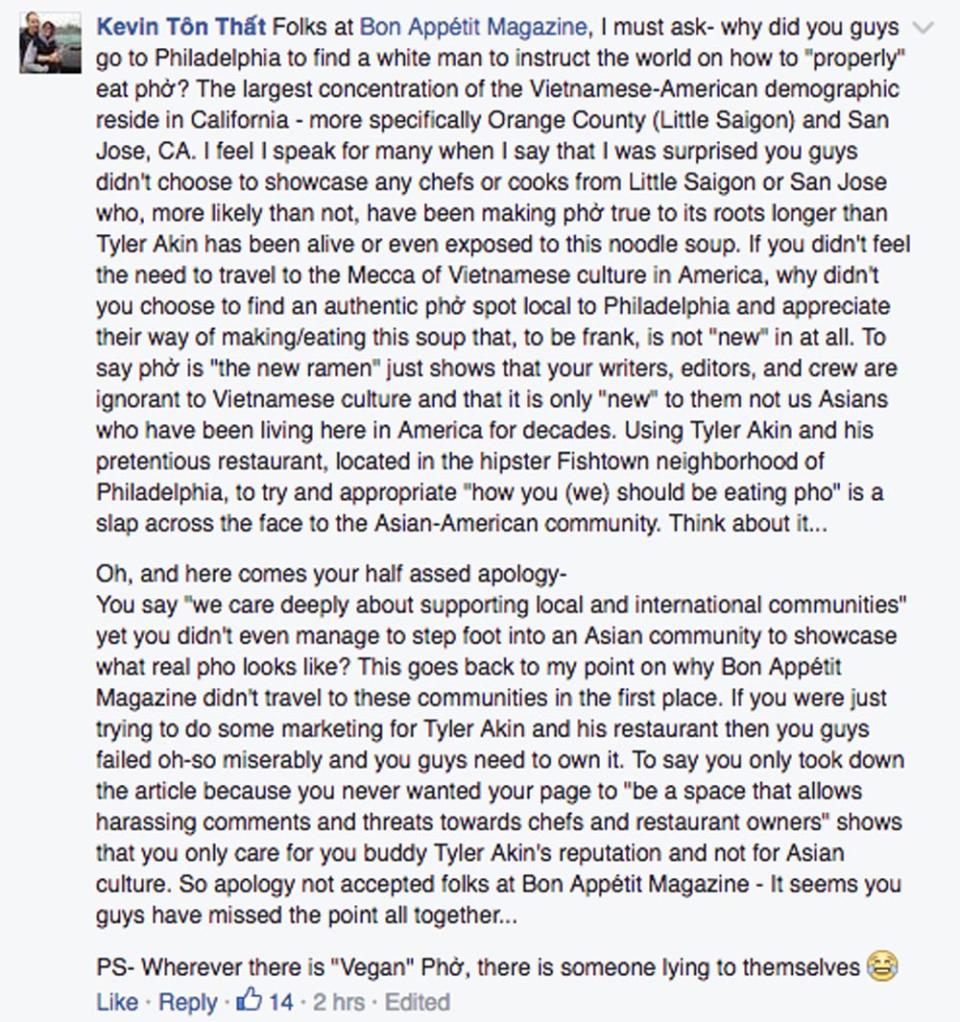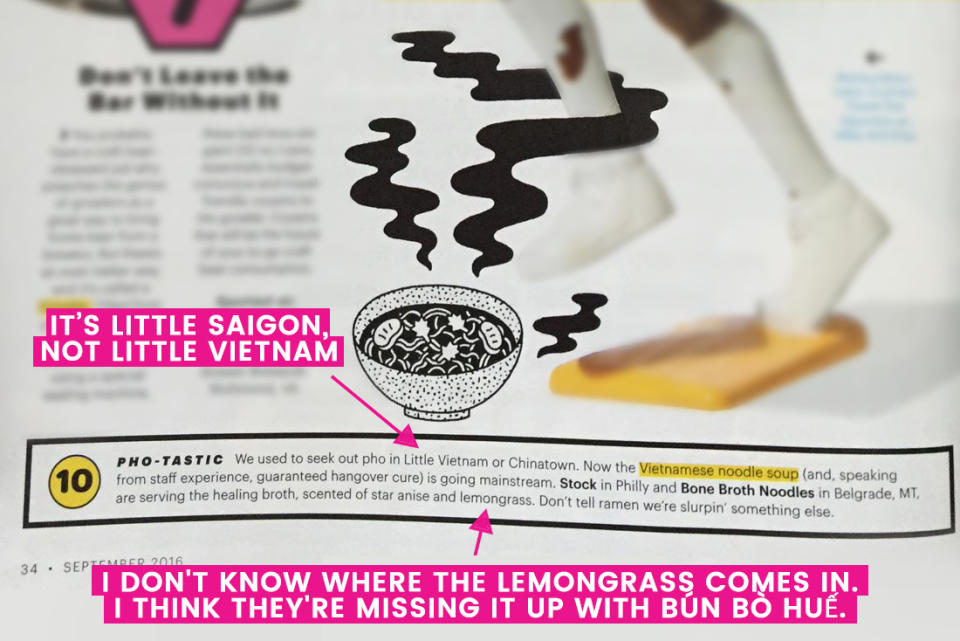People Are Pissed About This White Chef's Take on Pho. Here's Why You Should Care.

When Bon Appétit magazine posted a story Tuesday about a Philadelphia chef's take on pho, the headline declared, in the style of internet hyperbole, "PSA: This Is How You Should be Eating Pho."
By Thursday, Bon Appétit had changed the headline to "We're in Love with This Pho" (the URL slug is still /how-you-should-eating-pho). The companion video, featuring the chef Tyler Akin of the restaurant Stock making pho and explaining how to eat it, had been scrubbed from Bon Appétit's social channels. The restaurant's Instagram had been set to private. Its Yelp page had been slammed with 1-star reviews. The magazine posted a response on the story itself and on the magazine's Facebook page saying that it had never intended to offend its readers.
What could have gone so wrong with a 259-word story about a Vietnamese noodle soup dish?
In the video, according to multiple reports (I did not watch the video before it got taken down), Akin describes the proper way to eat pho. Stock's concept revolves around pho; Akin therefore gets positioned as an expert. In the video, he claims that the common practice of adding condiments to the broth doesn't show enough respect for the broth or the chef. (From the story: "Akin cautions that adding sriracha or hoisin sauce destroys the broth's flavor, which the chef worked so intently on building.") He shows a chopstick technique. The video claims that "pho is the new ramen."
Commenters showed a degree of outrage that's unusual for a Bon Appétit story. Many complained of cultural appropriation by a white chef and mostly white magazine staff. Others took issue with the idea that there's a "right" way to eat pho. "I'm Vietnamese and I always put hoisin or sriracha into my pho," one commenter wrote. "Don't tell me how I eat pho." Still others thought it was inappropriate to juxtapose ramen and pho.
Philly has mad Viet owned pho joints. Idk why you'd feature the one pho restaurant owned by a white guy...https://t.co/t8xOSqdNgj
- Big Zaddy Ivie🇳🇬 (@CHInekeIvie) September 8, 2016
Phil Yu of the blog Angry Asian Man called it "Columbusing at its finest."
Bon Appétit then removed the video and posted this response - not an apology, but an explanation of why it had taken the video down, which it blamed partly on the audience.
Hey Guys,In regards to a recent video we posted about making and eating pho, we want you to know that we hear you and we are listening. It is never our intention to offend our readers, which happened in this case. Thank you for calling us out.We believe in celebrating food from all cultures -- we just want to eat and talk about food, all the time. Moreover, we care deeply about supporting local and international food communities.At the same time, we never want to be a space that allows for harassing comments and threats toward chefs and restaurant owners. Ever. That's not what we're about. Which is why we have taken down this video.Moving forward, we will continue to strive to get people to cook smarter and eat better. And we will always be mindful of the messages we share.Thank you, as always, for being a part of what we do.
The response drew more ire from commenters. "Are you sorry or nah? If you're not, then just say so. It's not that hard," wrote one.

For his part, Akin told PhillyVoice.com, "My only comment is that I never intended to offend anybody, and I think that's all I can say."
It's clear that neither magazine nor chef had the "intent to offend" - but that's not really the point. What has surfaced in this debate are the thorny issues of race, culture, and prejudice that are inherent in not just food media coverage but in the way we eat, and these issues are not wholly apparent to everyone at the table.
Akin wasn't supposed to go viral. His restaurant Stock got a tiny mention in Bon Appetit's list of restaurant trends of 2016, a feature in its September restaurant issue. Pho "is going mainstream," the magazine wrote in a blurb about the so-called trend. "Don't tell ramen we're slurping something else."
Bon Appétit isn't the first to suggest that ramen is out and pho is coming up - but that in itself is problematic. "Why is it that for all of Asian cuisine, we only get to haveone noodle soup at a time?" said Andrea Nguyen, author of the forthcoming The Pho Cookbook. "It's so frustratingand insulting."

"The fact that we even think about [food] trends is absurd," said Krishnendu Ray, associate professor of food studies at NYU and author of The Ethnic Restaurateur. "When was pho not trendy amongst pho eaters?"
Though the magazine blurb mentioned another pho restaurant in Montana called Bone Broth Noodles (owned by a Vietnamese family), it chose to feature Akin in the accompanying web pieces, privileging a white chef over a Vietnamese one and unintentionally launching a fierce debate over ownership.
From Ray's point of view, the conflict is happening on multiple levels. First, there's Akin's position of chef-as-emperor. "He came to it from a chef's point of view," Ray said. "It has increasingly become this irritating, imperial point of view, which is, 'Let me tell you how to eat your food.'"
Nguyen agrees. While she herself is a proponent of keeping the broth in pho condiment-free, she isn't about to stop you. "Who am I to tell them that it's wrong? That's how they enjoyit. That's how they define their relationship with it."
Beyond that, there was the reductive arrogance of the story and video. "For me, appropriation is not about the thing, it is about your posture," Ray said. "Anybody can do anything they want - cook any food - and, in fact, I appreciate that. But do it with a humility and awareness of rich, long, unrecorded, unaccounted histories. Take something that has been used and consumed in a group, and then now it's appropriated by a chef and that becomes his signature? That's cultural malpractice."
For the consumer, or the people who love pho and have for a long time, it's a "structural clash," Ray said. "The power is shifting. Any white chef who cooks this kind offood is going to get in trouble now. What used to be subordinate groups are nolonger subordinate. That's the optimistic part for me."
Internet outrage can reach a pitch that verges on persecution, but sometimes, it can expose blind spots, and in this case, it did. There's a dialogue now, and perhaps more consideration of the reader as needing better, a more thoughtful treatment, even if the story is just about a bowl of noodle soup.
Update, 9/8/16, 7:48 p.m.: The video still exists online, because people on the internet are really resourceful. You can watch it below:
Follow Helin on Instagram.
You Might Also Like

